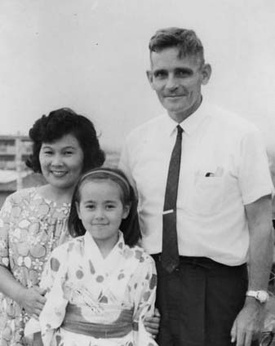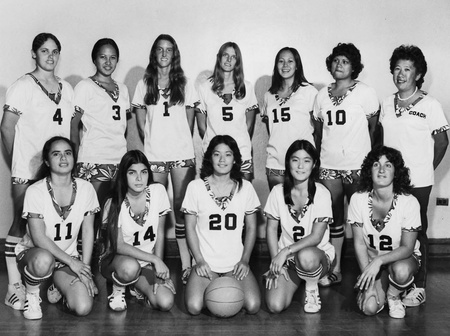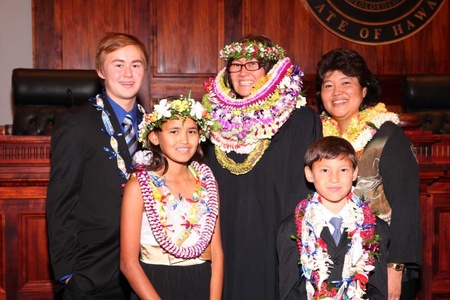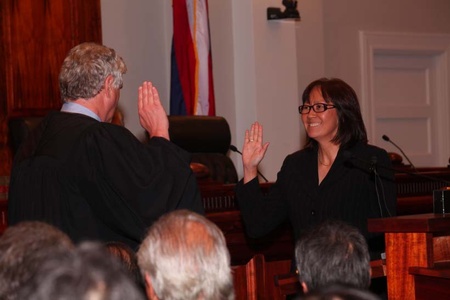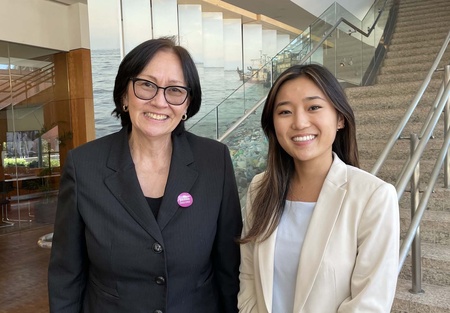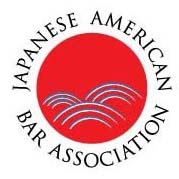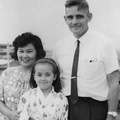As the first openly LGBTQ Asian American to serve on a state court of last resort, Justice Sabrina McKenna has had countless articles written about her. In preparation for our interview, I read most of the stories that feature her. Though the articles were informative, they all failed to capture Justice McKenna as a person: her charm, humor, and charisma.
Through my exclusive interview1, I hope to tell the side of Justice McKenna that traditional media does not capture—Sabrina McKenna as a Japanese American, a woman, a mother, and a community leader.
Sabrina McKenna was born on October 7, 1957, in Tokyo, Japan, to a Japanese mother and an American father. As a half, McKenna had a unique cultural experience growing up, going back and forth between feeling “too Japanese” or “too white.” She recalls going to the countryside to visit her aunts and uncles, and “people turning around and saying, ‘gaijin, gaijin,’ you know, foreigner, foreigner.” In contrast, at her U.S. DOD school2, she was considered “really Japanese,” as McKenna would speak in Japanese to her Japanese American friends “so nobody could understand what [they] were saying.” McKenna’s identity shifted depending on where she was.
In terms of her sexual orientation, McKenna notes that she didn’t realize it until she was in college. Her sexuality didn’t even cross her mind during her childhood and adolescence, for same-sex attraction was considered an abnormal psychological condition (according to the DSM3) until 1973. “I was dating boys,” she chuckles, “but when I look back on it, I would have much preferred spending time with my friends that were girls… it was a little bit of a different era in the sixties and seventies.”
Justice McKenna’s life drastically changed in 1972, when Title IX was passed. Title IX is the federal civil rights law that prohibits sex-based discrimination in any education program from the federal government. Title IX increased the opportunity for women to play sports at a collegiate level; as a result, Justice McKenna was given a scholarship to attend the University of Hawaii as a member of their first intercollegiate women’s basketball team. McKenna applauds the Congress members who pushed for the passage of Title IX, and especially highlights her appreciation for Patsy Takemoto Mink, the first woman of color to serve in the U.S. Congress who became a major sponsor for Title IX.
Without the passage of Title IX, McKenna would not have been able to attend college (as her scholarship paid for her out-of-state tuition), and she may not have been sitting on the bench today. Furthermore, being on the women’s basketball team not only allowed Justice McKenna to develop her team skills, but also allowed her to realize her sexual orientation. She recalls, “When I played basketball and there were, you know, athletes around me that were lesbian, I realized this was why I felt the way I had.”
McKenna found her interest in law as she progressed through college. Initially, McKenna aspired to work for the United Nations as a Japanese-English interpreter, as she grew up translating for her mother. But as she continued her education, McKenna realized that she did not want to just interpret what other people were saying, but to “have a voice and also give other people a voice.” McKenna’s passion for advocacy was sparked when she heard about Title IX and how one Japanese American congressperson (Patsy Takemoto Mink) was able to make such a big difference in the lives of so many people, including hers.
McKenna’s final push to apply for law school was given by an older friend and fellow athlete who started law school. McKenna remembers thinking, “Wow, athletes can go to law school”—she applied to law school the next year.
When asked about her experience as an Asian American student in law school, McKenna paused, commenting, “Being in Hawaii, you don’t feel being Japanese American as much as you do being a woman.” At the time, there were only one or two women judges statewide. It was only after the passage of Title IX that law schools began enrolling more women, and more firms began hiring women. Prior to Title IX, “only 7% of U.S. law school graduates were women,” McKenna recalls, “By the time I entered law school in 1979, one-third of my class was women.”
McKenna shared a discriminatory experience that she would never forget. In an interview for a law firm, one of the senior partners asked her, “Do you think you’re going to work for a couple of years and then quit and get married? Do you realize that if you come work at our law firm, you can’t leave during the day to go to PTA meetings?” In response, McKenna smiled at him and said, “May I ask you a question? Do you ask your male applicants these questions?” and then reported him to the employment director to say he was asking illegal questions. Although she ended up receiving an offer from that firm, McKenna went to another firm whom she felt wanted her for her skills and asset, not for the purpose of diversifying their firm.
After graduating from law school and working for law firms, McKenna became a law professor. Her passion for teaching stems from her love to mentor. McKenna believes “lawyers are leaders. So [she] felt like [she] was helping educate the next generation of leaders.”
During her time as a law professor in 1991, McKenna came out to her workplace. McKenna shares, “I didn’t even come out to a lot of my friends because frankly, I was battling my own internalized homophobia, trying not to be gay…People didn’t know that, but I was battling it.” McKenna reveals that she only felt comfortable coming out in 1991, because Hawaii became the third state in the country to prohibit employment discrimination on the grounds of sexual orientation. “Candidly, I didn’t feel comfortable coming out knowing that I could have been fired until then for being gay.”
McKenna believes her sexual orientation may have altered her career path. “When I look back on my life, I think that if I hadn’t been gay or closeted, I may have run for public office,” as she believes she was much more suited for the legislature to advocate for different bills. But instead of running for office, she became a judge.
McKenna’s path to becoming a judge was not a smooth one. The first time she applied to be a judge, she didn’t make the list. The second time, she didn’t. The third time, she finally did and was appointed to the circuit court. Between 2003 and 2010, McKenna applied for the Intermediate Court of Appeals, Supreme Court, and Federal Court and made over ten lists, but was never selected. It wasn’t until 2011 that she was appointed to her current position as the Justice of the Supreme Court of Hawaii.
At the press conference for her appointment, Justice McKenna made history by becoming the first openly LGBTQ+ Judge to serve on a state court of last resort. Her decision to come out was made rather spontaneously when a journalist asked Justice McKenna’s partner who she was, to which she responded, “I’m [Justice McKenna’s] partner.” Confused, the journalist asked, “Oh, law partner?” to which she said, “Oh, no, partner, partner.” Following this interaction, one of the media approached the governor’s press secretary and asked if Justice McKenna was willing to speak on the record of her sexual orientation. After consulting with her children, Justice McKenna came out publicly.
Justice McKenna decided to come out publicly after learning statistics about LGBTQ+ youth. “About a third or 40% of LGBTQ youth are kicked out of their homes when they come out to their parents, LGBTQ youth attempt suicide at four times the rate of straight youth, and that number increases to eight times if they are rejected by their parents. While 77% of white youth come out to their parents, that number is only 51% for Asian Pacific American youth.”
Knowing these statistics, Justice McKenna believed it was important for her, as a woman in a respectable position, to come out publicly, to provide hope for “not just the young people, but to tell their parents to accept their children. Gay people, LGBTQ people can be happy, can have families, and can be professionally successful and live regular lives.”
Her message was reached in both the U.S. and Japan. At Justice McKenna’s Senate confirmation hearing, strangers came up to her, including women much older than her, telling her that they’ve decided to be open because of her example. In Japan at Waseda University, law professors and lawyers asked her questions about coming out publicly. People in Japan were never willing to be open before, but Justice McKenna’s positive example encouraged others to be their true selves.
Justice McKenna believes her career and success would not have been possible without the support from the Japanese American community and the LGBTQ community. She considers it an honor to be able to give back in whatever ways she can, whether it’s through speaking, lecturing, mentoring, or sitting on the bench as a representative of both communities. Justice McKenna further applauds the Japanese American community for taking strong leadership roles against all sorts of discrimination, including anti-LGBTQ and anti-Muslim, “because we understand discrimination.”
As a young Japanese American woman interested in pursuing a career in law, I was truly inspired by Justice McKenna’s career. Candidly, I was intimidated by the fact that I was going to be meeting a Justice of Hawaii’s Supreme Court, and was a nervous wreck prior to our interview. However, being able to meet her in person allowed me to realize that Justice McKenna is a human being, just like the rest of us. She had her own challenges she had to overcome before getting to her current position. She has a sense of humor and a charm about her that puts everyone at ease. She has a passion for advocacy like the rest of us—only she made it her career.
Justice McKenna is a role model for young women, the LGBTQ community, and the Asian American community. She opened a path for future leaders with varying backgrounds to take leadership roles while being proud of who they are. Justice Sabrina McKenna is a true inspiration for all.
Notes:
1. Interview video highlights will be posted on Discover Nikkei website under “Interviews.”
2. U.S. DOD school: A global network of schools that the United States Department of Defense (DOD) administers to serve the dependents of the U.S. military personnel.
3. DSM: The Diagnostic and Statistical Manual of Mental Disorders (DSM) is the standard classification used by health care professionals in the US as the authoritative guide to the diagnosis of mental disorders.
* * * * *
The Japanese American Bar Association (JABA) Legacy Project creates profiles of prominent jurists, legal legends and leaders in the Japanese American community through written articles and oral histories. In particular, these profiles pay special attention to these pioneering jurists’ reflections on JABA, their distinguished careers, and their involvement in the Japanese American community.
This is one of the main projects completed by The Nikkei Community Internship (NCI) Program intern each summer, which the Japanese American Bar Association and the Japanese American National Museum have co-hosted.
Check out other JABA Legacy Project articles published by past NCI interns:
- Series: Pioneering Jurists in the Nikkei Community by Lawrence Lan (2012)
- Series: Legal Legends in the Nikkei Community by Sean Hamamoto (2013)
- Series: Two Generations of Pioneering Judges in the Nikkei Community by Sakura Kato (2014)
- “Judge Holly J. Fujie—An Inspirational Woman Who Was Herself Inspired by Japanese American History and Community” by Kayla Tanaka (2019)
- “Mia Yamamoto—A Leader Who Defined the Nikkei Community” by Matthew Saito (2020)
- “Patricia Kinaga—Attorney, Activist, and Mother Who Has Given a Voice to Those Who Don’t Have One” by Laura Kato (2021)
© 2022 Lana Kobayashi


